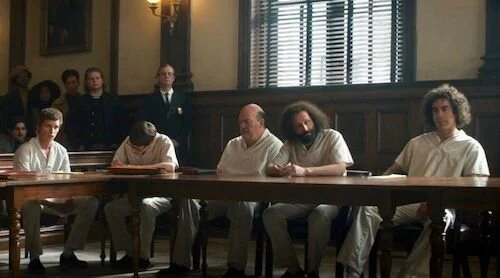The Trial of the Chicago 7
Of course it took Aaron Sorkin to make a film about the trial surrounding the seven (technically eight at one point) strangers that bound together to rebel at the 1968 Democratic National Convention. The ability to have each character state their viewpoints in the court of law just has Sorkin’s technical touch all over it. So, it gestated into his second directorial feature (after Molly’s Game), and his finest effort yet as the head honcho. However, like Molly’s Game (which is still great, by the way), The Trial of the Chicago 7 still contains some of the same tonal confusions that the previous film boasted, as if Sorkin, while a good director, is best as the screenwriter of these films, and a unique eye (say, David Fincher or Danny Boyle) could frame them in the best ways. When Sorkin is at his best behind the camera, Chicago 7 is as riveting as his finest moments in films directed by others. Words flow out of characters mouths at a constant but enticing rate, and every technical term just manages to make sense when Sorkin is working with them.
However, at times, Chicago 7 feels like Sorkin is trying to make a feature film, and it shows. As innovative as he is as a screenwriter, he occasionally goes for convention as a director. The climactic moments of the film are all somewhat cheesy in their own ways, and it does take away from the electricity of the dialogue being spoken. I could imagine Fincher would have maybe neutralized some of these more cookie cutter moments, rendering them more human (because it’s the humanism of the technical that makes Sorkin such a master at what he does, so seeing this go overboard is somewhat sad). These moments are relatively few, luckily, and Chicago 7 is mostly quite a ride, I’m pleased to say. Sorkin renders each defendant, lawyer, and other participant (including the uncaring judge Julius Hoffman) as a unique personality, which likely stems far away from how these players were in real life, but they make for great contrasting forces here. These include stoner hippies, the more reserved rebels, and the older generation that cannot take it anymore. Nonetheless, each character speaks Sorkin’s typical jargon, and it’s as effective as always.
The eccentric cast help makes Chicago 7 as electrifying as can be.
Each character deserves a great performer, and Chicago 7 has those in spades, ranging from Mark Rylance firing on all cylinders and Eddie Redmayne delivering a straightforward and convincing performance, to Sacha Baron Cohen finally giving us some meat and potatoes to nibble on. Chicago 7 goes straight into the trial, as Sorkin knows that this kind of back-and-forth discussing is what we’re all here for; histories are revisited via testimonies. The laying out of the events that led up to this trial are scattered and slowly revealed, making Chicago 7 somewhat of a mysterious experience; it’s as if we are the jury trying to piece together what we are witnessing, even if it’s out of order. If it wasn’t for the occasional safety blanket decision — especially at the worst times — The Trial of the Chicago 7 could have been Aaron Sorkin’s undeniable opus as a director. However, it’s Sorkin business as usual, and that’s rarely a bad thing. The Trial of the Chicago 7 is great enough to enjoy, but there are small cracks that may leave you knowing that there could have been tweaking that could have rendered this the indisputable film of the year. Hey, a flawed film being great is nothing to really complain about, right?
Andreas Babiolakis has a Masters degree in Film and Photography Preservation and Collections Management from Ryerson University, as well as a Bachelors degree in Cinema Studies from York University. His favourite times of year are the Criterion Collection flash sales and the annual Toronto International Film Festival.






